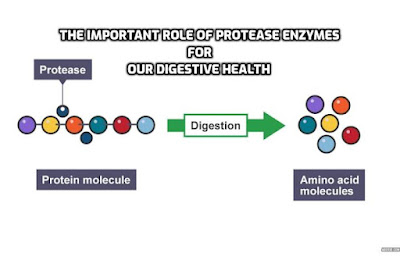Protease Enzymes: The Protein Breakdown Specialists
Protease enzymes, often referred to simply as proteases, are a remarkable group of enzymes that specialize in breaking down proteins into smaller components. These enzymes play a pivotal role in various biological processes, from digestion to cellular regulation.
In this post, we will delve into the world of protease enzymes, exploring their functions, sources, and the vital role they play in maintaining our health and well-being.
Introduction
Protease enzymes are essential players in the intricate symphony of biochemical reactions within our bodies. They are tasked with the vital role of breaking down complex protein molecules into simpler forms, allowing for easier absorption and utilization. Understanding the various types of protease enzymes and their sources can help us appreciate their significance.
Understanding Protease Enzymes
Protease enzymes are a subclass of enzymes responsible for catalyzing the hydrolysis of peptide bonds in proteins. This process results in the degradation of proteins into peptides and amino acids, which are fundamental building blocks for various cellular functions.
Types of Protease Enzymes
Trypsin
Trypsin is a protease enzyme primarily produced in the pancreas. It plays a pivotal role in the digestion of dietary proteins. Trypsin cleaves peptide bonds at specific sites in protein molecules, breaking them down into smaller peptides.
Chymotrypsin
Chymotrypsin, another protease enzyme produced in the pancreas, complements trypsin in protein digestion. It cleaves peptide bonds at different locations, ensuring that proteins are effectively broken down into manageable fragments.
Papain
Papain is a protease enzyme found in papaya fruit. It is renowned for its digestive properties and is often used as a meat tenderizer. Papain can also aid in the digestion of other dietary proteins when consumed with meals.
Bromelain
Bromelain, derived from pineapple stems and cores, possesses not only protease activity but also potent anti-inflammatory properties. It supports protein digestion and has been explored for various health benefits.
Natural Sources of Protease Enzymes
In addition to the pancreas-produced protease enzymes involved in digestion, natural food sources provide enzymes that aid in the breakdown of dietary proteins.
These sources include:
- Papaya: Papain in papaya is particularly effective at breaking down meat proteins.
- Pineapple: Bromelain in pineapple can assist in protein digestion.
- Kiwi: Kiwi contains the enzyme actinidin, which aids in protein breakdown.
Protease Enzymes in Digestion
The primary function of protease enzymes is to facilitate the digestion of dietary proteins. They ensure that proteins are broken down into peptides and amino acids, making them easier for the body to absorb and utilize. Without protease enzymes, efficient protein digestion would be challenging.
Protease Enzymes and Cellular Regulation
Beyond their role in digestion, protease enzymes also participate in cellular regulation. They are involved in the removal of damaged or unwanted proteins within cells, contributing to cellular health and function.
Health Benefits of Protease Enzymes
Protease enzymes have garnered attention for their potential health benefits, which include:
- Improved Digestion: Protease supplements may aid individuals with digestive issues in breaking down proteins more efficiently.
- Anti-Inflammatory Effects: Bromelain, in particular, is known for its anti-inflammatory properties and has been studied for its potential in managing inflammatory conditions.
- Wound Healing: Protease enzymes have been utilized in wound care products to assist in tissue repair and wound healing.
Choosing Protease Enzyme Supplements
When considering protease enzyme supplements, it’s essential to select high-quality products from reputable brands. These supplements can be beneficial for individuals who may have digestive difficulties or are seeking the potential health benefits of protease enzymes.
Incorporating Protease Enzymes into Your Diet
For those who prefer natural sources, incorporating protease-rich foods like papaya, pineapple, and kiwi into their diet can offer digestive support. These fruits can be enjoyed fresh or as part of various culinary creations.
Watch this video –The Top Signs of a Digestive Enzyme Deficiency
Conclusion
Protease enzymes are the unsung heroes of protein metabolism, playing critical roles in digestion, cellular regulation, and overall health.
Whether obtained from natural food sources or through supplements, protease enzymes offer a range of potential benefits that can enhance our well-being.
By understanding their functions and sources, we can make informed choices about how to harness the power of protease enzymes for improved health and vitality.

No comments:
Post a Comment